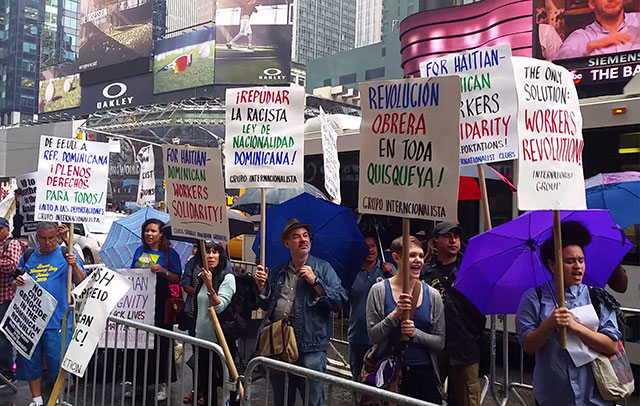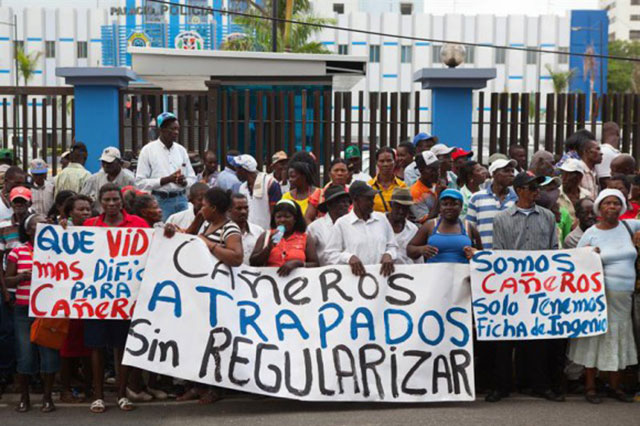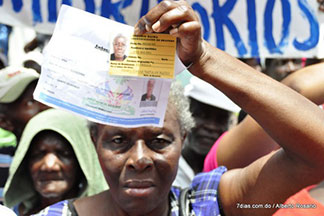
June 2015
Down with the Racist Dominican
Nationality Law –
For Haitian-Dominican Workers Solidarity
Stop Expulsion
of Haitians
from the Dominican Republic

Dominican police repress Haitian Dominicans seeking papers allowing them to stay (temporarily) in the country where many of them were born. Mass deportations are scheduled to begin after June 17 registration deadline. Hundreds of thousands are affected. (Photo: Nehemías Alvino/Diario Libre)
In the U.S. and
D.R.: Full Citizenship Rights for All!
For Workers Mobilization Against Deportations and Racist
Attacks
The following article is an expanded version of the Internationalist Group leaflet distributed at the June 15 NYC protest described below.
JUNE 16 – Beginning this week, the government of the Dominican Republic intends to start the mass expulsion of Haitians and Dominicans of Haitian descent. This impending human disaster has been passed over with virtual silence by U.S. and international media. Based on a racist nationality law, hundreds of thousands of Dominicans have been deprived of their citizenship and are at risk of being seized on the street, at their workplace or in their homes in desperately poor bateyes (shantytowns), and dumped across the border in Haiti. Many have lived all their lives in the Dominican Republic, don’t speak Kreyòl and have no relatives in the neighboring country. Now they are officially stateless, with no rights at all anywhere.
An emergency protest was held on June 15 outside the Dominican Consulate in New York City. The Internationalist Group, CUNY Internationalist Clubs and Class Struggle Education Workers participated in the protest while calling for workers action against the deportations and racist attacks, and for full citizenship rights for all living in the Dominican Republic. Against the racist champions of anti-Haitian “Dominicanness” (dominicanidad) we call for workers revolution throughout Quisqueya (Hispaniola). The key is Haitian-Dominican workers solidarity, and the place where it can begin is New York City, where hundreds of thousands of Dominican and Haitian immigrants are likewise deprived of rights by racist immigration laws.
Moreover, we point out that Dominican-Haitian tensions are fueled by U.S. imperialism. The system of importing Haitian workers to carry out backbreaking labor in the Dominican Republic, with no rights, was set up when both countries were under U.S. occupation that began a century ago. In addition, the Dominican border police, the Cuerpo Especializado de Seguridad Fronteriza (CESFRONT), was set up at the instigation of Washington in 2006 as part of its drive to militarize U.S. borders, and it has been trained by the U.S. Border Patrol. And last year, U.S. vice president Joe Biden on a trip to Santo Domingo grotesquely praised the Dominican nationality law as a “bold step” that would provide a “path to citizenship” for people of Haitian descent, when in fact it makes official the stripping of their citizenship!
Rather than looking to U.S. politicians and the Obama government – which itself deports over 400,000 people a year, including thousands of Haitians and Dominicans – to hypocritically pressure the administrators of its Dominican semi-colony, we demand an immediate end to deportations, release everyone in the immigration jails and concentration camps and full citizenship rights for all immigrants in the U.S. as well.

Internationalists at protest outside Dominican Consulate in New York City, June 15, protesting racist nationality law and demanding stop of deportations, in Dominican Republic and the U.S. (Internationalist photo)
June 17 is the deadline for registration under the Dominican Republic’s Program of Identification and Documentation of Immigrants from Haiti (PIDIH) and the National Program of Regularization of Foreigners (PNRE, according to its Spanish acronym). These two programs were set up to implement the September 2013 Dominican Constitutional Tribunal sentence (TC168-13) and subsequent Law No. 169-14 that decreed that any person born in the Dominican Republic whose parents, grandparents, great-grandparents or earlier progenitors migrated to the country without immigration documents since 1929 be stripped of their citizenship. In practice, this racist legal battery applies exclusively to Dominicans of Haitian descent.
In contravention of norms throughout the Americas providing the right of citizenship to all those born in the country (jus soli), the Dominican Republic joins with Chile under the Pinochet dictatorship in basing it on “blood law” (jus sanguinis), excluding the children of “foreigners.” And it joins Hitler’s Third Reich, whose infamous Nuremberg Laws canceled the citizenship of Jews, in excluding a particular group. These Nazi-like laws and decrees “denationalize” upwards of half a million Dominicans in addition to persecuting another half million immigrants born in Haiti who are a key component of the workforce. Any defender of democratic rights must demand the immediate abrogation of the Dominican Republic’s racist nationality law.
Under these grotesque laws and decrees, any “foreigner” without the required papers will be subject to immediate deportation. There should be no doubt that the Dominican government is preparing for mass deportations, on an industrial scale. Already it has requisitioned a fleet of buses sufficient to deport 2,000 people a day. A formal agreement has been signed with the Dominican Army to carry this out, and detention facilities have been set up along to border.
The general who heads the immigration department announced that “beginning Thursday” (June 18) teams including soldiers “will comb urban areas with large numbers of immigrants to detain and deport those who have not registered” (El Nacional, 16 June). Agents have been “trained to pick up in the street those who, by their appearance, could be foreigners without residence permits.” El Nacional adds that while 250,000 people have registered to legalize their status, only a few hundred have received a temporary residency permit, and “many of the immigrants, especially those who have lived in the Dominican Republic for decades, have no identity papers at all” and thus cannot register.1
Dominican authorities have carried out mass expulsions in the past. In 1999, tens of thousands were deported to Haiti in just two weeks. Buses cruised the streets of the Dominican capital of Santo Domingo snatching anyone who “looked Haitian,” including hundreds of dark-skinned Dominicans. Although Dominican authorities claim that deportations have been suspended for the last year, they have soared at the main border crossing point in the north, reaching 6,700 in the first four months of this year, triple the rate of 2014. So far, some 53,000 Dominicans have had their citizenship canceled, and while this was later supposedly reversed, they have not received identity cards and thus could be picked up and expelled.
Meanwhile, as always when the Dominican authorities step up anti-Haitian repression, this has been accompanied by an escalation of anti-Haitian bigotry and gruesome attacks, lynchings and pogroms. On February 10, a Haitian man, Henry Claude Jean (known as “Tulile”), 35, a shoe shine worker, was found hanging from a tree in Santiago Park. The day before, a machete-wielding band of masked Dominican nationalists gathered in Santiago to trample on and burn a Haitian flag while calling for mass deportations. Videos have circulated on the Internet of a mob attack on April 8 in the city of Moca that drove out 300 Haitians. Images show young men beating women, breaking into homes and smashing everything in sight with the complicity of the National Police.
Amid this mounting anti-Haitian hysteria, as the June 17 deadline approached thousands of undocumented Dominicans have sought to register, even as foreigners, to avoid being deported. But while long lines have formed outside the registration offices, only small numbers are admitted. There have been angry protests every day this week in the capital of Santo Domingo, dispersed by police using tear gas. The Union of Cane Workers was promised 10,000 permits for those receiving pensions after working decades in the sugar cane fields, but only 2,900 have been approved since most lack even Haitian papers, and only a small number have been given documents. Meanwhile, some 49,000 people live in the bateyes on the sugar plantations.
The government of the Dominican Republic is infamous for its continuous racist and xenophobic attacks against the Haitian population. This can be traced all the way back to the 1937 “perejil” massacre2 led by U.S. puppet Generalissimo Rafael Trujillo, a/k/a El Chivo (The Goat). More than 30,000 Haitians and dark-skinned Dominicans were massacred from October 2 to 8 of that year near what in Haiti is called Massacre River.3 Trujillo headed the National Guard, which was set up by the U.S. occupation authorities, and the U.S. government effectively condoned the massacre, including by agreeing to a miserable $525,000 in reparations. But of the supposed $30 per victim, survivors only received 2 cents each. The racist immigration decree “Sentencia 168/13” is just the continuation of those attacks targeting Dominicans of Haitian descent, this time by “legal” means.
For decades Haitians have provided very cheap labor for the
Dominican bourgeoisie. Not only do they do the backbreaking
work of harvesting sugar cane in conditions of near slavery,
Haitian workers are also the core of construction workforce in
the Dominican Republic, including in building the Santo
Domingo metro. Haitians as well as their children born in the
Dominican Republic are an integral part of the Dominican
working class. But due to the racist hysteria whipped up by
the authorities, they are constantly being harassed,
persecuted and attacked. The bateyes where they live
often lack a basic infrastructure of potable water and
electricity, and they are easy prey for lynch mobs there.

Above: Union of Sugar Cane Workers (UTC) demonstrating outside police headquarters in Santo Domingo, May 25, demanding papers. Signs say “Cane Workers Trapped, Unable to Regularize” and “We Are Cane Workers, We Only Have ID From the Sugar Mills.” Below: even with Haitian identity documents, retired sugar cane worker unable to obtain papers to prevent deportation, June 15. (Photos: 7dias.com.do)

Ever since the Trujullo dictatorship, official government policy has been that everything Haitian is condemned as bad, and must be eradicated. The 1937 massacre set off a process of “bleaching” the Dominican population. After Trujillo was assassinated in 1961 (with the complicity of the CIA, as the Democratic Kennedy administration figured El Chivo had become a liability), the U.S. invaded the country a second time, in 1965, this time under Democrat Lyndon Johnson, to prevent the Dominican Republic from “going Communist.” Long-time Trujillo aide Joaquín Balaguer was installed as the U.S.’ Dominican flunkey, and the racist policies continued during his seven terms as president.
The present “denationalization” of Dominicans of Haitian descent has been carried out under the presidencies of Leonel Fernández and Danilo Medina, both of the Dominican Liberation Party (PLD). But it was based on the 2004 immigration law enacted by the government of Hipólito Mejía of the Dominican Revolutionary Party (PRD), which classified undocumented residents as “in transit.” When one of those affected, Juliana Deguis Pierre, appealed to the courts, the Dominican Constitutional Tribunal ruled on 23 September 2013 to uphold the racist law, and make it retroactive to anyone whose ancestors arrived in the Dominican Republic in the last 84 years! Hundreds of thousands of Dominicans were declared “in transit” although they were born there and lived in the D.R. their entire lives.
From the 2004 Dominican immigration law onwards, we are seeing a real “ethnic cleansing in the Caribbean,” as Sonia Pierre, the late president of the Movement of Dominican-Haitian Women (MUDH) titled an article.4 Although she was hardly radical (she was twice given awards by the imperialist U.S. government), the leader of the MUDH received constant death threats because of her defense of Dominicans of Haitian origin. Pierre died in December 2011 due a heart attack caused by hypertension in the midst of a ferocious hate campaign and persecution against her orchestrated by the government, media and business sectors. World-famous Dominican author Junot Díaz has also been demonized and labeled a “traitor” for denouncing the infamous “Sentencia 168/13.”
While the bourgeois ruling parties of the Dominican Republic, the police and army are up to their necks in the racist persecution of Haitian Dominicans, the Dominican left and labor movement have done little or nothing to combat it. The Partido de los Trabajadores Dominicanos mildly criticized the 2013 sentence, but it does not support the right of Dominicans of Haitian descent to citizenship, and it runs in election in a bloc with the PLD. Narciso Isa Conde, leader of the Izquierda Revolucionaria (remnant of the former Dominican Communist Party), did issue a statement against the exclusionary laws, but overall the left has been shamefully absent in the struggle against the virulent racist attack on this most vulnerable sector of Dominican working people.
Although weakened, there are still a number of unions in the Dominican Republic (CASC, CNTD, CNUS), but while they have occasionally called national strikes against the economic policies of the PLD government, they have not joined together with the Dominican Haitian workers of the Unión de Trabajadores Cañeros de los Bateyes (UTC). When the UTC has marched for medical insurance, to extend and increase pensions and now to obtain legal papers, they have done so alone. The Movimiento de Trabajadores Independientes (MTI) has spoken out for rights for Dominicans of Haitian origin, but on May 1, the international workers day, and in recent talk of a general strike, this burning issue has been unmentioned. Solidarity action by Dominican unions against the mass deportations to Haiti would throw the country into turmoil, yet such an internationalist program of militant class struggle is anathema to the present pro-capitalist misleaders of labor.
The international outcry against the xenophobic "Sentencia 168/13" has been very strong, even among imperialist organizations like the United Nations, the Interamerican Court of Human Rights and pro-imperialist “non-governmental organizations” like Amnesty International. But of course, this will have no effect. U.S. imperialism is so concerned about a mass exodus from Haiti (whose poverty is a direct result of U.S. policies, from the destruction of rice farming to superexploiting Haitian workers in garment sweatshops) that it has permanently posted the Coast Guard to prevent “boat people” from escaping, it has kept Haiti under occupation by “U.N.” mercenary troops (the MINUSTAH) since 2004, and it invaded the country following the 2010 earthquake in order to prevent unrest.
After the Dominican court’s ruling was announced there were several protests in New York City in 2013 demanding that it be reversed. In 2008, the Internationalist Group helped initiate and organize a demonstration bringing together Dominican, Haitian and U.S. leftists and labor activists to protest the racist treatment of Haitians in the Dominican Republic. But such protests are not enough.5 What is needed is a class-struggle program that seeks to mobilize the power of the working class on both sides of the Hispaniola island in defense of Haitians and their children as well as here in New York City, where well over 100,000 Haitians and more than 600,000 Dominicans live.
“Sentencia 168/13,” the 2004 nationality law and all the rest are scraps of paper that can be ripped up. That requires a class-conscious working class which fights against the chauvinist poison of nationalism. The Internationalist Group and League for the Fourth International proclaim, as stated in the Communist Manifesto, that the workers have no fatherland. We call for the fighting unity of Haitian, Dominican and U.S. workers against capital and the racist rulers.
Stop the expulsions of Haitians from the Dominican Republic!
Defend Haitians in the Dominican Republic against violence and persecution!
Down with the racist anti-Haitian Dominican immigration laws!
Down with attempts to disenfranchise Dominicans of Haitian origin!
Full citizenship rights for all who live in the
Dominican Republic … and the U.S.! ■
- 1 Since the 2004 immigration law, Dominican hospitals have routinely refused to issue birth certificates for babies born to undocumented parents. Without this, children cannot be entered in the civil registry, and without identity papers cannot attend schools.
- 2. Soldiers ordered detainees to say perejil (parsley in Spanish), which many French and Kreyól speakers find hard to pronounce. Anyone who failed to do so “properly” was killed on the spot.
- 3. For a detailed account of lynch mobs against Haitians, see “Stop Persecution of Haitian Workers in the Dominican Republic!” The Internationalist No. 23, April-May 2006.
- 4. Sonia Pierre, “Ethnic Cleansing in the Caribbean,” Project Syndicate, 3 December 2008.
- 5. See “New York Protest Against Persecution of Haitian Workers in the Dominican Republic,” The Internationalist No. 28, March-April 2009.
